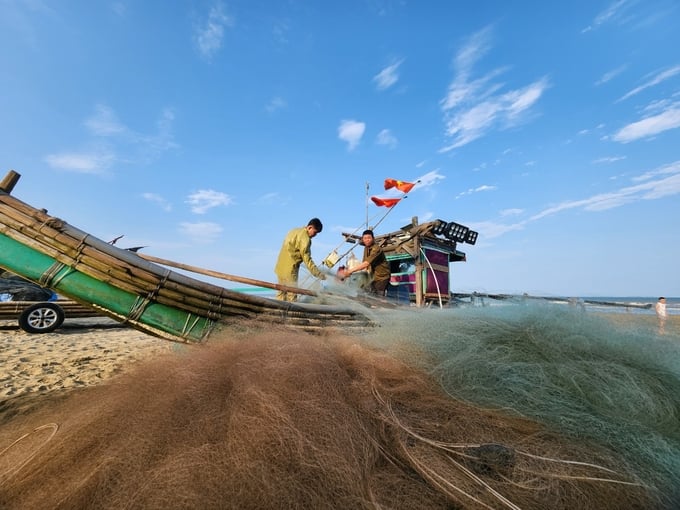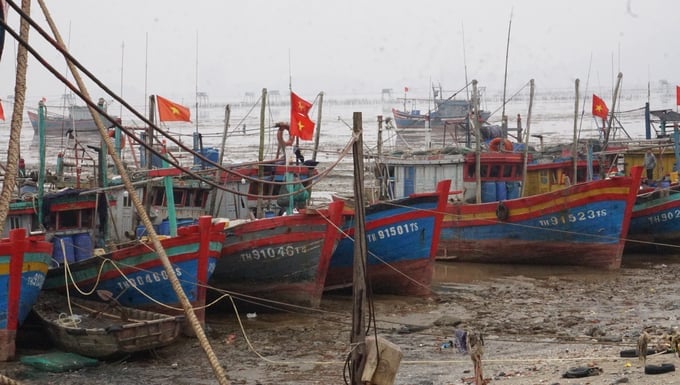May 16, 2025 | 10:13 GMT +7
May 16, 2025 | 10:13 GMT +7
Hotline: 0913.378.918
May 16, 2025 | 10:13 GMT +7
Hotline: 0913.378.918
Thanh Hoa province is currently managing a fleet of over 6,000 fishing vessels, with a 100% vessel monitoring system installation rate. Additionally, the province houses 8 fishing ports, 4 storm shelters, 28 shipbuilding and repairing facilities, and 80 seafood processing and exporting businesses.
The province's total seafood yield reached over 215 thousand tons in 2023, including over 142 thousand tons of fishing yield, and nearly 74 thousand tons of aquaculture yield. Notably, the province's estimated fishing and aquaculture yield reached nearly 69 thousand tons in the first four months of 2024, marking an increase of over 100% compared to the corresponding period in 2023.
According to Mr. Nguyen Duc Cuong, Deputy Director of the Thanh Hoa province's Department of Agriculture and Rural Development, the Provincial Party Committee, the Provincial People's Committee, and all levels of local governments have actively and systematically implemented various anti-IUU (illegal, unreported, and unregulated) fishing activities. This initiative was carried out in compliance with the guidelines set by the Party Central Committee, the Government, the Prime Minister, and the Ministry of Agriculture and Rural Development,

Despite its success, Thanh Hoa province's anti-IUU fishing campaign is facing significant challenges. Photo: Quoc Toan.
"With the active involvement of the entire local government system from the provincial to grassroots levels, Thanh Hoa province's anti-IUU fishing campaign has yielded commendable results, which have been recognized by the Ministry of Agriculture and Rural Development, the Government, and the Prime Minister. Additionally, the province has successfully raised awareness regarding IUU fishing for the local officials, residents, and fishermen," emphasized Mr. Cuong.
Notably, Thanh Hoa province has not received new reports of fishing vessels being detained and prosecuted for infringing on foreign waters. Furthermore, all local fishing vessels measuring over 6 meters in length have been marked, registered, and entered into the national fisheries database (VnFishbase).
Similarly, all fishing vessels measuring between 6 and 12 meters in length have been granted fishing licenses; all fishing vessels measuring over 15 meters in length have been equipped with vessel monitoring systems; 97.8% of fishing vessels measuring over 12 meters in length have been granted fishing licenses; and 95.8% of fishing vessels measuring over 15 meters in length have been granted certifications for food safety conditions.
However, Mr. Cuong also acknowledged the existing challenges within Thanh Hoa province's anti-IUU fishing campaign. Namely, local fishing vessel's failure to maintain their vessel monitoring system connection during operations at sea is still prevalent within the province. Moreover, a substantial number of small fishing vessels operating in coastal areas fail to comply with the reporting requirements for fishing activities. Additionally, the limited educational background of local fisherman may occasionally result in errors in the recording of fishing logbook.
In response to these challenges, Deputy Director Nguyen Duc Cuong stated that the province will continue to enhance the dissemination of anti-IUU fishing regulations, and assign responsibilities to leaders of local party committees and government agencies. Furthermore, Thanh Hoa will instruct relevant agencies to strengthen their inspection and control efforts at fishing ports, and monitor vessels operating at sea. This initiative aims to ensure that all departing fishing vessels must fully comply with with procedural requirements, and maintain connection of their vessel monitoring system.
On the other hand, the province will mobilize a diverse range of capital, particularly from businesses and social sources, to invest in upgrading fisheries infrastructure; promote the development and restructuring of the fisheries sector towards industrialization, modernization, and producing commodities along the value chain in combination with production restructuring; reinforce national efforts against IUU fishing activities, thereby promoting the sustainable development of the fisheries sector.
Ho Chi Minh City Law Newspaper, in coordination with the Thanh Hoa Provincial People's Committee, held a seminar on "Concerted efforts to remove the IUU yellow card" in Thanh Hoa province on April 26. During the event, Dr. Nguyen Viet Thang, former Deputy Minister of the Ministry of Agriculture and Rural Development and Chairman of the Vietnam Fisheries Association, emphasized that the removal of EC's "yellow card" is one of Vietnam's most crucial task in the current global context.
Regarding solutions to remove the "yellow card," Dr. Thang shared: "We need to focus on monitoring and penalizing fishing vessels that infringe on foreign waters. To accomplish this task effectively, we must rely on the public's vigilance to detect fishing vessels engaged in illegal fishing activities. In addition, it is necessary to encourage the participation of the Vietnamese Fatherland Front and other political organizations in the collective effort to remove the EC's 'yellow card'."
According to Dr. Thang, in addition to the removal of the "yellow card," the sustainable development of Vietnam's fisheries sector requires stakeholders to conduct survey on the reserves of fisheries resources; develop suitable exploitation plans; and promote an occupational transition towards aquaculture, seafood processing, tourism, among others. Moreover, he emphasized the need to develop fisheries exploitation in association with environmental protection and fisheries resources conservation.

Fishing vessels anchored along the coastline of Ngu Loc commune, Hau Loc district, Thanh Hoa province. Photo: QT.
Assoc. Prof. Dr. Vu Thanh Ca, former Head of the International Cooperation - Science and Technology Department under the Vietnam Administration of Seas and Islands, stated: "As a direct result of the EC's 'yellow card', Vietnam's seafood exports to the EU have rapidly declined. If violations in fishing activities persist, Vietnam will receive a 'red card', which will result in a comprehensive ban on seafood exports to Europe. This ban is equivalent to an annual loss of approximately 500 million USD for Vietnam's fisheries sector."
However, according to Mr. Ca, adhering to the EC's recommendations enables Vietnam to mitigate losses in seafood exports; enhance its national position on the global stage; and promote the restoration of rapidly depleting fisheries resources.
Regarding the removal of the EC's 'yellow card', as well as the broader policy framework for sustainable fisheries development, Mr. Ca emphasized the importance of strict management over fishing activities. Namely, the government must mandate the installation of vessel monitoring systems on all offshore fishing vessels. Accordingly, vessels that deliberately disconnect their vessel monitoring systems are subject to heavy penalties, with the possibility of a termination of operation. Furthermore, he advocates for heightened inspection and control measures that incentivize accurage fishing logbook keeping, in order to facilitate seafood origin tracing.
"We must strictly prohibit, heavily penalize, and if necessary, prosecute captains and owners of fishing vessels that engage in illegal fishing activities within foreign waters. Destructive fishing practices such as blast fishing must be strictly prohibited. We must also promote the industrial-scale farming of high-value seafood species, with a focus on clean farming technologies. Namely, we can implement high-tech intensive aquaculture models that utilize water treatment and circulation technologies. We should also promote seafood processing and exports, coupled with the development of processing businesses, to create flagship products that reflect the unique characteristics of each Vietnamese region," Mr. Ca emphasized.
Translated by Nguyen Hai Long

(VAN) Cold-barn systems efficiently manage environmental and temperature conditions, which aids in the prevention of respiratory diseases in pigs and protects them from the vectors that transmit African swine fevers.

(VAN) To tackle challenges, the project 'Addressing key technical bottlenecks in the grouper supply chain in Vietnam' has been underway since 2024.

(VAN) The project 'Disease-Resilient and Sustainable Cassava Production Systems in the Mekong Region', funded by the Australian Center for International Agricultural Research (ACIAR), is being implemented from 2024 to 2028.

(VAN) Data from 10,000 farming households will help professionalize production organization and support the implementation of the One Million Hectares Program for High-Quality, Low-Emission Rice Cultivation.

(VAN) FAO Director-General QU Dongyu marks International Day of Plant Health at NENA conference.

(VAN) Deputy Minister of Agriculture and Environment Hoang Trung affirmed that floriculture and ornamental plants are a growing industry that receives significant global attention.

(VAN) The three staple crops dominating modern diets – corn, rice and wheat – are familiar to Americans. However, fourth place is held by a dark horse: cassava.